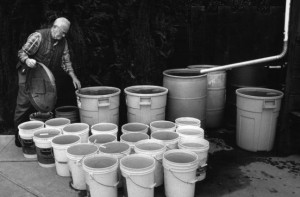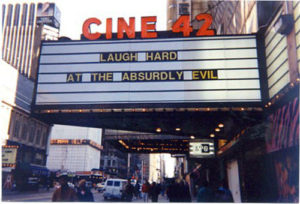Do you know what politicians, particularly conservative politicians, despise the most?
Hint: It’s the same thing organized religions fear above all else, the same thing governments both large and small are often aggressively reluctant to embrace, the same thing we as a species, as a culture, as individuals are told, over and over again, that we should resist, perhaps even violently and blindly, lest the gays and the vegans and the terrorists come and take away our iPhones.
It’s change, of course. Life’s most upsetting, dreaded and yet fantastically enduring aspect. Did you already suspect?
It’s simple, really: Most forms of change freak us out because we’re trained to detest the discomfort of the new, that awkward, even painful adjustment period that forces our beloved habits, beliefs and addictions into weird new shapes (once we adjust, all is fine, of course; it’s that clumsy liminal phase we aren’t well adapted to cope with).
It’s not always bad, of course: some change – fresh love, a new puppy, pec implants, your first successful orgy – can spark us alive, can give you hope and wish for even more of same. Change that brings gifts, bounty, fulfillment, some finely toned abs? We like.
It’s the other kind of change we can’t stand: loss, heartbreak, lack of security, threats to our fragile moral certainties, to our most beloved habits and ingrained cultural behaviors. We love our stuff. Ask us to limit or even eliminate some previously abundant, gluttonous, sort of thoughtless conduct we’ve become accustomed to – oil, energy, food, housing, transportation, shopping, cheap gas, dumb entertainment, water? That’s grounds for uprising, pal.
Or so we are told. And taught. And it’s a silly and dangerous lie.
Behold! California, deep in the initial stages of a jarring, lifestyle-shattering drought, one that threatens to forcibly restructure, at nearly every level, the 9th largest economy in the world. And no politician, religion, or fistful of money can stop it.
How are we to respond? What sort of unprecedented melodrama awaits in the coming summer, and the next? One thing we know: Lack of water is going to change us in ways we are only barely beginning to fathom, and it won’t just be arguments over pools, golf courses and almond orchards.
I am here to propose a possibility: Perhaps all is not so dire. Perhaps, despite all the grim adjustments that await, despite the political maneuvering, the invisible billionaires who control way too much of the state’s economy (including water), we are, nevertheless, on the cusp of something sort of amazing, a profound – and profoundly beneficial – psychological shift that can serve us well into the future.
Is it possible? After all, as pointed out by multiple experts and historians, it’s a freak historical anomaly that we’ve been living in an age when you can merely turn on the tap and boom, there’s all the free, clean, drinkable water you could possibly want, enough for a million swimming pools, golf courses, lawns galore, not to mention enough to flood a semi-arid state with a trillion acre-feet of water to grow all sorts of products we have no business growing.
This is not normal. This is not how it’s been, ever before, in human history. Such a bizarre, environmentally abusive framework of water gluttony was never long for this world.
Here is our chance. Here’s the opportunity to defy everything conservative politicians and religions alike tell us to fear and dumbly ignore – all the waste, corruption, resource abuse that’s plagued our state, our country, since forever, to the benefit of, well, of them.
This drought is an equal opportunity transformer. No one is immune. No one will not be challenged to adapt in new and curious ways.
Of course we can survive, even thrive, with far more dramatic cutbacks, with far less water. It will be strange and difficult. Careful, thoughtful resource management is not, after all, the American way. But should this drought continue unabated and should we, therefore, quickly realize just how valuable, how beautiful, how not to be taken for granted is the water we have left, we’ll cultivate perhaps the most precious resource of all: gratitude.
Read more here:: Does California’s catastrophic drought have an upside?





